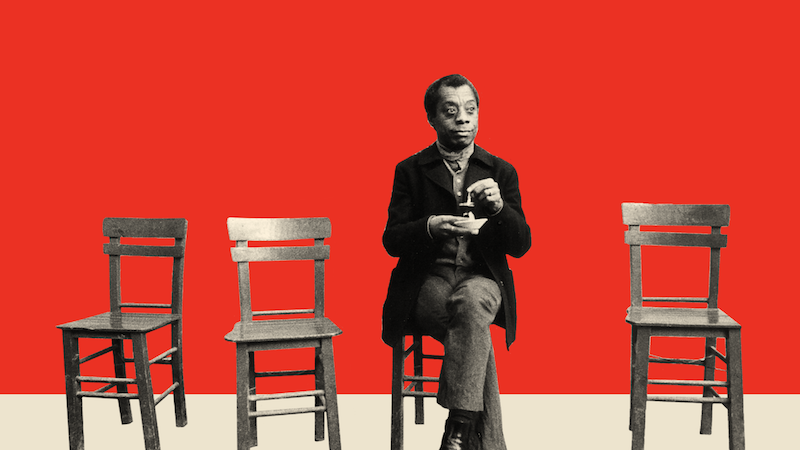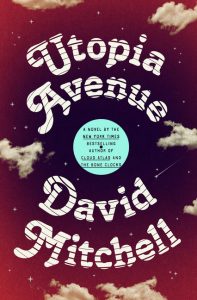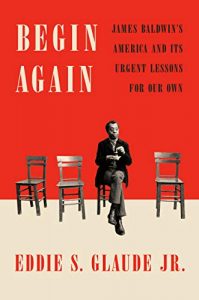
This week’s Fab Five includes Jonathan Dee on David Mitchell’s Utopia Avenue, Veronica Roth on Sophie Mackintosh’s Blue Ticket, Hari Kunzru on Masha Gessen’s Surviving Autocracy, Leo Robson on Joyce Carol Oates’ Night. Sleep. Death. The Stars., and Jennifer Szalai on Eddie S. Glaude Jr.’s Begin Again.
*

“Not unlike Jasper himself, Utopia Avenue turns out to have been a sort of host for something else entirely. To go further would be to give too much away—not to everyone, perhaps, but certainly to readers of Mitchell’s earlier work … What it all amounts to is that Utopia Avenue exists on two different planes. Jasper’s suffering, his visions and auditory ‘hallucinations’—tragically, pathologically insubstantial to the other characters within the realistic landscape of the book—are, to the initiated reader, quite real, more real than the various historical genre trappings, such as Carnaby Street, or the Chelsea Hotel, or zombie David Bowie …The sense of supernatural threat, of being pursued, for mysterious reasons, across time, as part of a conflict too large for individual lifetimes to contain: this is the novel’s reality, even as the characters (apart from Jasper) are oblivious of it … Is this a great writer of unfathomably long vision making a kind of Yoknapatawpha out of the entirety of space and time, or the rendering of something like fan service? Maybe both. Just as the members of Utopia Avenue themselves are the flip side of DeLillo’s vision of rock music and its myth-scaled heroes, Mitchell’s cross-referencing for its own sake could be the more benevolent, affirmative side of our era’s taste for conspiracy, in which everything is improbably connected and there’s a secret pattern that only the enlightened can see.”
–Jonathan Dee on David Mitchell’s Utopia Avenue (The New Yorker)
“This lack of concrete information is far from frustrating, but rather essential to the narrative effect: something allegorical and dreamlike, a story that doesn’t so much declare things about our outside world as reveal, intimately, Calla’s interior one. That isn’t to say there are no meaningful parallels to be drawn between the protagonist’s experience and that of being a woman in today’s world—but these are drawn not through the dystopian premise, but through the story’s thoughtful specificity … Mackintosh successfully avoids a potential pitfall of the genre: its single-issue focus … adds something new to the dystopian tradition set by Orwell’s 1984 or Atwood’s The Handmaid’s Tale. Those novels were like mirrors, meant to reflect us back to ourselves with horrifying clarity. Blue Ticket concerns itself more with its small cast of characters than with the world they occupy, but the novel is no less relevant or incisive for its intimacy. It is as much about the tension between independence and obligation, between desire and capability, as it is about contemporary womanhood: under constant threat just for having a body, and longing to decide your own fate.”
–Veronica Roth on Sophie Mackintosh’s Blue Ticket (The New York Times Book Review)
“The book is a slow medium. A writer never knows what kind of world a book will land in, what will change around the words on the page as the publishing industry grinds through its cycle. For the unlucky, a sudden shift can invalidate a work or render it incomprehensible. The title of Masha Gessen’s polemic about the Trump presidency is Surviving Autocracy. What was a metaphor when Gessen wrote it—at least for those not directly targeted by Republican policies—has now become literal. The corruption and incompetence that Gessen condemns in this urgent book have killed tens of thousands of Americans, many of whom may have felt themselves immune to the violent chaos that Trumpian politics has unleashed since 2016 … Surviving Autocracy contains much that will be familiar to anyone who has followed the news over the last few years, but there is something about seeing all this in the aggregate that sharpens an edge of disgust lately blunted by relentless use. The book is a snapshot of how far American public life has been degraded, how the vaunted democratic system of checks and balances has collapsed, and how the conventions of journalism and policy debate have hampered the task of holding power to account … We are at a dangerous tipping point. Trump is still an aspiring autocrat, and cynicism has not yet triumphed altogether. But Covid is a disruption of unprecedented severity, whose full consequences are only beginning to be felt.”
–Hari Kunzru on Masha Gessen’s Surviving Autocracy (The New York Review of Books)
“Oates’s friend the novelist John Gardner once suggested that she try writing a story ‘in which things go well, for a change.’ That hasn’t happened yet…Among contemporary American fiction writers—and, since the deaths of Philip Roth and Toni Morrison, she possesses a strong claim to preëminence—Oates most clearly displays what Henry James called ‘the imagination of disaster,’ a faculty or frailty she often gives to her creations … the novel is so teeming with nuances and details and inklings that you barely have time to register the irony that Whitey died in the course of defending a victim of racial profiling, despite having been soft on police violence during his time as Hammond’s mayor—or that Thom’s two causes are inherently at odds, one pertaining to the fallout of a racially charged assault, the other incipiently racist. At times, there’s little to hold on to. But then, why should the reader be afforded the feeling of terra firma so persistently denied to the characters? … Now and again, you’re reminded of Martin Amis’s grievance that, though James Joyce could take you anywhere, he keeps taking you places you don’t want to go. And yet there is great joy to be derived from the novel’s submerged patterns, its mind-boggling fecundity, its gallimaufry of devices (stream of consciousness, analytic omniscience, sentences both snaking and staccato), its combination of intricacy and lucidity … Although Oates rejects cohesion as a formal virtue, she has a coherent vision of what literature can deliver. She believes in the itching and the ornery and the oddly shaped, and has been trying to produce fiction that feels as irreducible to simple meanings, as resistant to paraphrase, as the subject matter it portrays.”
–Leo Robson on Joyce Carol Oates’ Night. Sleep. Death. The Stars. (The New Yorker)

“Baldwin’s example took on renewed relevance toward the end of the Obama presidency, as soaring hopes collided with an enduring reality of police violence and mass incarceration. Writers found in Baldwin a mix of rigor and freedom: Here was an unsparing diagnostician who nevertheless embraced contradictions … Glaude is more explicit about looking to Baldwin not just for perspective and inspiration but for instruction and guidance: Combining elements of biography, criticism and memoir, Begin Again ‘aims to think with Baldwin and to interrogate how an insidious view of race, in the form of Trumpism, continues to frustrate any effort to “achieve our country”‘ … But I soon realized that Glaude is up to something bigger than his own summary allowed. Where a number of writers have paid ample tribute to Baldwin’s essays from the late ’50s and early ’60s, during the early years of the civil rights movement, Glaude finds energy and even solace in the later nonfiction that charted Baldwin’s disillusionment. Even if you don’t agree with Glaude’s interpretations, you’ll find yourself productively arguing with them. He parses, he pronounces, he cajoles. He spurs you to revisit Baldwin’s work yourself.”
–Jennifer Szalai on Eddie S. Glaude Jr.’s Begin Again: James Baldwin’s America and Its Urgent Lessons for Our Own (The New York Times)

